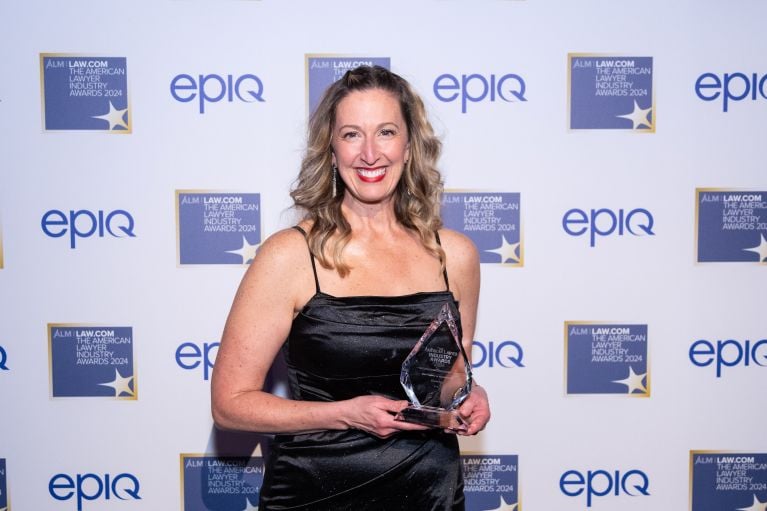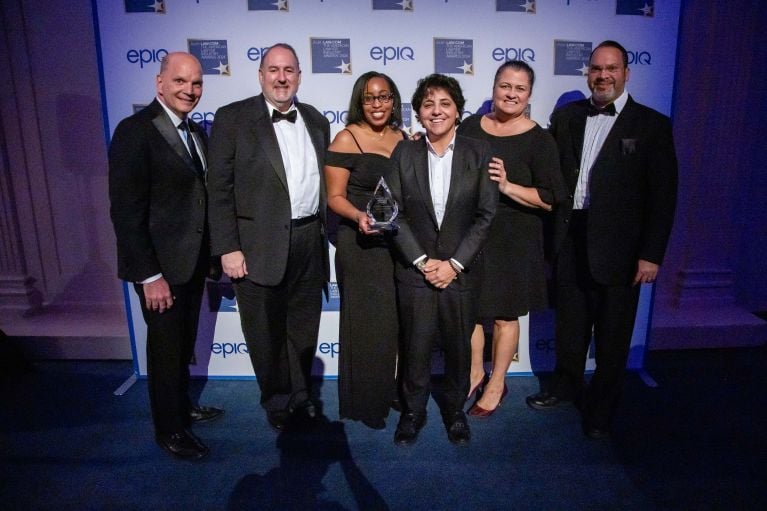Why In-House Counsel Have Made LGBTQ Inclusion a Priority
Several general counsel whose companies have been lauded for their treatment of LGBTQ employees weigh in on why inclusion matters.
November 20, 2017 at 02:11 PM
10 minute read
 Photo Illustration: Jason Doiy/The Recorder.
Photo Illustration: Jason Doiy/The Recorder.
The Human Rights Campaign Foundation recently released its annual report assessing LGBTQ inclusion in major U.S. companies and law firms. And it looks as though many organizations have stepped up their game.
This year, 609 companies earned the top score of 100, based on such factors as offering equivalent spousal and partner medical benefits for LGBTQ employees, offering transgender-inclusive health insurance coverage and prohibiting discrimination based on sexual orientation and gender identity or expression.
This is a marked increase from the 517 that received the top rating last year, and it represents the highest number of top-rated businesses since the first Index in 2002, according to the 2018 Corporate Equality Index.
“The top-scoring companies on this year's CEI are not only establishing policies that affirm and include employees here in the United States, they are applying these policies to their operations around the globe and impacting millions of people beyond our shores,” said HRC President Chad Griffin in a statement. “In addition, many of these companies have also become vocal advocates for equality in the public square, including the dozens that have signed on to amicus briefs in vital Supreme Court cases and the 106 corporate supporters of the Equality Act.”
We reached out to several in-house attorneys from top-ranked companies about why and how they've focused on making their workplaces LGBTQ-friendly. Responses have been edited for clarity and length:
David Zapolsky, senior vice president, general counsel and secretary at Amazon.com Inc.:
Equality has been a core value at Amazon from the start. We believe all our employees deserve equal treatment, and we've worked hard to ensure that our policies and culture reflect that. For example, we were an early supporter of marriage equality and transgender rights, and we provide the same benefits to our straight employees and their partners as we do to our LGBTQ employees and their partners. And we've had an active LGBTQ employee affinity group, glamazon, since 1999.
[This is a priority at Amazon because] it's simply right. We want all of our employees to have the same rights, and as a company we've taken a firm stand on this. I'm very proud of the work Amazon has done on behalf of our LGBTQ employees.
Lori Schechter, executive vice president, general counsel and chief compliance officer at McKesson Corp.:
We think of the HRC's Corporate Equality Index as the gold standard for best practices. Five years ago, we proactively reviewed all of our policies and practices—from workplace harassment to parental leave and health insurance parity—to really ensure we were meeting those high standards. We went through those policies and if we hadn't identified it before as an area we wanted to focus on, we made sure we did. And then we made sure we had senior leaders talking about this and that we engaged our employee resources.
One reason this is a focus for us is because of our company values, called “ICARE.” The “R” stands for “respect,” and that's a big focus for us. Because of that, aligning with HRC's policies in this regard fits squarely into our vision of respect. We also believe that a diverse and inclusive workforce really does produce the best results for customers and those within the business, so we are constantly reviewing and taking steps to ensure that we are aligned in that way.
Stacey Maris, senior vice president, assistant general counsel and secretary at AT&T Inc.:
The starting point for us is really that diversity is one of our core values at AT&T. It starts with our chairman and it cascades throughout the company. And our leadership in this space goes back to 1975, when AT&T became one of the first major corporations in the United States to adopt a policy prohibiting discrimination based on sexual orientation. Then, in 1987, an employee resource group was established called LEAGUE at AT&T, which is an employee resource group for LGBT employees. In 1998, we adopted a domestic partner benefits program, and in 2006, we began offering transgender-inclusive health care benefits.
I think that as a fundamental matter, this is just the right thing to do. We recognize all forms of diversity and we think they're all important. And then we want to give people space in the workplace to be authentic, because it drives innovation and creativity.
To stay in the know about top issues for in-house counsel, email [email protected] to sign up for “Inside Track,” a new email briefing from Law.com. Written once a week by reporter Jennifer Williams-Alvarez, this newsletter keeps you up to date on what your in-house colleagues are up to.
 Photo Illustration: Jason Doiy/The Recorder.
Photo Illustration: Jason Doiy/The Recorder.
The Human Rights Campaign Foundation recently released its annual report assessing LGBTQ inclusion in major U.S. companies and law firms. And it looks as though many organizations have stepped up their game.
This year, 609 companies earned the top score of 100, based on such factors as offering equivalent spousal and partner medical benefits for LGBTQ employees, offering transgender-inclusive health insurance coverage and prohibiting discrimination based on sexual orientation and gender identity or expression.
This is a marked increase from the 517 that received the top rating last year, and it represents the highest number of top-rated businesses since the first Index in 2002, according to the 2018 Corporate Equality Index.
“The top-scoring companies on this year's CEI are not only establishing policies that affirm and include employees here in the United States, they are applying these policies to their operations around the globe and impacting millions of people beyond our shores,” said HRC President Chad Griffin in a statement. “In addition, many of these companies have also become vocal advocates for equality in the public square, including the dozens that have signed on to amicus briefs in vital Supreme Court cases and the 106 corporate supporters of the Equality Act.”
We reached out to several in-house attorneys from top-ranked companies about why and how they've focused on making their workplaces LGBTQ-friendly. Responses have been edited for clarity and length:
David Zapolsky, senior vice president, general counsel and secretary at
Equality has been a core value at Amazon from the start. We believe all our employees deserve equal treatment, and we've worked hard to ensure that our policies and culture reflect that. For example, we were an early supporter of marriage equality and transgender rights, and we provide the same benefits to our straight employees and their partners as we do to our LGBTQ employees and their partners. And we've had an active LGBTQ employee affinity group, glamazon, since 1999.
[This is a priority at Amazon because] it's simply right. We want all of our employees to have the same rights, and as a company we've taken a firm stand on this. I'm very proud of the work Amazon has done on behalf of our LGBTQ employees.
Lori Schechter, executive vice president, general counsel and chief compliance officer at
We think of the HRC's Corporate Equality Index as the gold standard for best practices. Five years ago, we proactively reviewed all of our policies and practices—from workplace harassment to parental leave and health insurance parity—to really ensure we were meeting those high standards. We went through those policies and if we hadn't identified it before as an area we wanted to focus on, we made sure we did. And then we made sure we had senior leaders talking about this and that we engaged our employee resources.
One reason this is a focus for us is because of our company values, called “ICARE.” The “R” stands for “respect,” and that's a big focus for us. Because of that, aligning with HRC's policies in this regard fits squarely into our vision of respect. We also believe that a diverse and inclusive workforce really does produce the best results for customers and those within the business, so we are constantly reviewing and taking steps to ensure that we are aligned in that way.
Stacey Maris, senior vice president, assistant general counsel and secretary at
The starting point for us is really that diversity is one of our core values at
I think that as a fundamental matter, this is just the right thing to do. We recognize all forms of diversity and we think they're all important. And then we want to give people space in the workplace to be authentic, because it drives innovation and creativity.
To stay in the know about top issues for in-house counsel, email [email protected] to sign up for “Inside Track,” a new email briefing from Law.com. Written once a week by reporter Jennifer Williams-Alvarez, this newsletter keeps you up to date on what your in-house colleagues are up to.
This content has been archived. It is available through our partners, LexisNexis® and Bloomberg Law.
To view this content, please continue to their sites.
Not a Lexis Subscriber?
Subscribe Now
Not a Bloomberg Law Subscriber?
Subscribe Now
NOT FOR REPRINT
© 2024 ALM Global, LLC, All Rights Reserved. Request academic re-use from www.copyright.com. All other uses, submit a request to [email protected]. For more information visit Asset & Logo Licensing.
You Might Like
View All
Digging Deep to Mitigate Risk in Lithium Mine Venture Wins GM Legal Department of the Year Award
5 minute read
Elaine Darr Brings Transformation and Value to DHL's Business

PepsiCo's Legal Team Champions Diversity, Wellness, and Mentorship to Shape a Thriving Corporate Culture
Trending Stories
- 1Judge Denies Sean Combs Third Bail Bid, Citing Community Safety
- 2Republican FTC Commissioner: 'The Time for Rulemaking by the Biden-Harris FTC Is Over'
- 3NY Appellate Panel Cites Student's Disciplinary History While Sending Negligence Claim Against School District to Trial
- 4A Meta DIG and Its Nvidia Implications
- 5Deception or Coercion? California Supreme Court Grants Review in Jailhouse Confession Case
Who Got The Work
Michael G. Bongiorno, Andrew Scott Dulberg and Elizabeth E. Driscoll from Wilmer Cutler Pickering Hale and Dorr have stepped in to represent Symbotic Inc., an A.I.-enabled technology platform that focuses on increasing supply chain efficiency, and other defendants in a pending shareholder derivative lawsuit. The case, filed Oct. 2 in Massachusetts District Court by the Brown Law Firm on behalf of Stephen Austen, accuses certain officers and directors of misleading investors in regard to Symbotic's potential for margin growth by failing to disclose that the company was not equipped to timely deploy its systems or manage expenses through project delays. The case, assigned to U.S. District Judge Nathaniel M. Gorton, is 1:24-cv-12522, Austen v. Cohen et al.
Who Got The Work
Edmund Polubinski and Marie Killmond of Davis Polk & Wardwell have entered appearances for data platform software development company MongoDB and other defendants in a pending shareholder derivative lawsuit. The action, filed Oct. 7 in New York Southern District Court by the Brown Law Firm, accuses the company's directors and/or officers of falsely expressing confidence in the company’s restructuring of its sales incentive plan and downplaying the severity of decreases in its upfront commitments. The case is 1:24-cv-07594, Roy v. Ittycheria et al.
Who Got The Work
Amy O. Bruchs and Kurt F. Ellison of Michael Best & Friedrich have entered appearances for Epic Systems Corp. in a pending employment discrimination lawsuit. The suit was filed Sept. 7 in Wisconsin Western District Court by Levine Eisberner LLC and Siri & Glimstad on behalf of a project manager who claims that he was wrongfully terminated after applying for a religious exemption to the defendant's COVID-19 vaccine mandate. The case, assigned to U.S. Magistrate Judge Anita Marie Boor, is 3:24-cv-00630, Secker, Nathan v. Epic Systems Corporation.
Who Got The Work
David X. Sullivan, Thomas J. Finn and Gregory A. Hall from McCarter & English have entered appearances for Sunrun Installation Services in a pending civil rights lawsuit. The complaint was filed Sept. 4 in Connecticut District Court by attorney Robert M. Berke on behalf of former employee George Edward Steins, who was arrested and charged with employing an unregistered home improvement salesperson. The complaint alleges that had Sunrun informed the Connecticut Department of Consumer Protection that the plaintiff's employment had ended in 2017 and that he no longer held Sunrun's home improvement contractor license, he would not have been hit with charges, which were dismissed in May 2024. The case, assigned to U.S. District Judge Jeffrey A. Meyer, is 3:24-cv-01423, Steins v. Sunrun, Inc. et al.
Who Got The Work
Greenberg Traurig shareholder Joshua L. Raskin has entered an appearance for boohoo.com UK Ltd. in a pending patent infringement lawsuit. The suit, filed Sept. 3 in Texas Eastern District Court by Rozier Hardt McDonough on behalf of Alto Dynamics, asserts five patents related to an online shopping platform. The case, assigned to U.S. District Judge Rodney Gilstrap, is 2:24-cv-00719, Alto Dynamics, LLC v. boohoo.com UK Limited.
Featured Firms
Law Offices of Gary Martin Hays & Associates, P.C.
(470) 294-1674
Law Offices of Mark E. Salomone
(857) 444-6468
Smith & Hassler
(713) 739-1250







